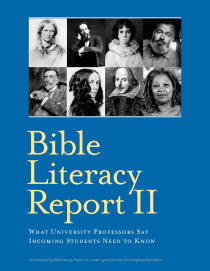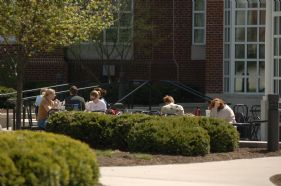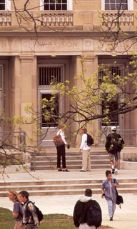Prof. Wayne Glausser Contributes to National Report on Bible Literacy
June 6, 2006
 June 6, 2006, Greencastle, Ind. - Wayne E. Glausser, professor and chair of English at DePauw University, is quoted in a new, national report, "Bible Literacy Report II: What University Professors Say Incoming Students Need to Know." Funded by the John Templeton Foundation, the survey reveals that English professors surveyed at leading universities -- including Yale, Harvard, Princeton and Stanford -- agreed that "regardless of a person's faith, an educated person needs to know about the Bible."
June 6, 2006, Greencastle, Ind. - Wayne E. Glausser, professor and chair of English at DePauw University, is quoted in a new, national report, "Bible Literacy Report II: What University Professors Say Incoming Students Need to Know." Funded by the John Templeton Foundation, the survey reveals that English professors surveyed at leading universities -- including Yale, Harvard, Princeton and Stanford -- agreed that "regardless of a person's faith, an educated person needs to know about the Bible."
Released by the Bible Literacy Project at an academic symposium on the Bible at Baylor University, the report surveyed 39 English professors at 34 top U.S. colleges and universities, who said that knowledge of the Bible is a deeply important part of a good education.
"The virtual unanimity and depth of their responses on this question  were striking," said Marie Wachlin, researcher and author of the Bible Literacy Report II. "The Bible is not only a sacred scripture to millions of Americans, it is also arguably, as one professor put it, the most influential text in all of Western culture."
were striking," said Marie Wachlin, researcher and author of the Bible Literacy Report II. "The Bible is not only a sacred scripture to millions of Americans, it is also arguably, as one professor put it, the most influential text in all of Western culture."
Dr. Wachlin adds, "Overwhelmingly, professors in this survey indicated that a lack of basic Bible literacy hampers students' ability to understand both classics and contemporary work. Arduously 'decoding' scripture references detracts from absorbing and responding to great works of art, both ancient and modern," she explains.
"Loss of recognition [of the Bible] in the last three or four decades has put much of Western literature beyond the reach of many readers," says David Lyle Jeffrey, Distinguished Professor of Literature and the Humanities at Baylor University, who led the team that produced the Dictionary of Biblical Tradition in English Literature. Adds Ulrich Knoefplmacher, professor of ancient and modern literature at Princeton University: "Not to have a knowledge of the Bible is almost crippling in students' ability to be sophisticated readers."
DePauw's Dr. Glausser is quoted several times in the 52-page report. "I think whenever I'm dealing with a work of literature which has some kind of
Later in the survey, Glausser observes, "There should be a canon of other works that deserve similar emphasis. I think a weakness in backgrounds of students is that even if they know the Bible reasonably well, they're not as likely to know much about the Qur'an. Some of them, unless they grow up in a Mormon tradition, they might be astonished to learn some of the scriptural background to Mormonism. They are a little naive about what it means to have a sacred text, what beliefs are. I'm all in favor of courses that we now are offering in a sense of comparative religious canons. As useful as the Bible is and as influential as it is, there's still some other texts that I'd want to hold up as just as important as a foundation," the DePauw professor asserts.
to have a sacred text, what beliefs are. I'm all in favor of courses that we now are offering in a sense of comparative religious canons. As useful as the Bible is and as influential as it is, there's still some other texts that I'd want to hold up as just as important as a foundation," the DePauw professor asserts.
The conclusions of the new Bible Literacy Report II match findings in the April 2005 Bible Literacy Report I: "What do American teens need to know and what do they know?," in which 98% of leading high school English teachers surveyed said that Bible knowledge gives a distinct academic advantage. Ninety percent of the high school teachers in the 2005 study said Bible knowledge is critical to a good education. Teachers said teens are "clueless," "stumped," and "confused" and that a lack of Bible knowledge is harming their ability to understand British and American literature, as well as art, music, history and culture.
Read an executive summary of the report here, and access a PDF of the complete document by clicking here.
